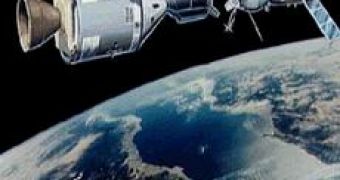The days when the Soviet Union and the US were engaged in a fierce space race (as well as a cold war) are long gone, but not forgotten. Many of you remember, perhaps, the historic moment when U.S. and Soviet space vessels met in orbit in 1975 and a handshake was heralded as a symbolic step toward a future of international space-travel cooperation. Astronauts and cosmonauts of the Apollo and Soyuz spacecraft said Thursday that their mission led directly to the cooperation necessary for the international space station and other multinational projects, as reported by Rebecca Carroll for Associated Press.
"I am convinced that all future flights will be international," cosmonaut Aleksei A. Leonov said at a NASA-sponsored ceremony marking the 30th anniversary of the first manned space flight managed jointly by two nations. "It's possible that an international crew would land on Mars."
At Thursday's ceremony at the National Air and Space Museum, there was little talk of the U.S. space program's rocky recent history. Participants instead recalled the details of friendships between Cold War enemies made possible by the 1975 success.
The Apollo-Soyuz mission proved that U.S. and Soviet spacecraft were compatible, despite different measuring systems and air pressure standards. It also more symbolically proved U.S.-Soviet cooperation was possible despite diplomatic tensions.
"It was the very heights of the Cold War, with thousands of nuclear weapons aimed at each country," said retired Lt. Gen. Thomas Stafford, who manned the Apollo with Vance Brand and the late Donald Slayton. "Yet both superpowers had great accomplishments in space, so we decided to work together."
"We were able to succeed because we never got into politics," said Valeriy Kubasov, Soyuz' other cosmonaut of the 1975 flight.

 14 DAY TRIAL //
14 DAY TRIAL //